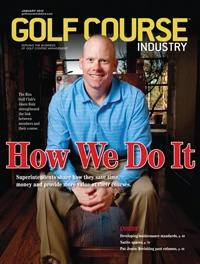I was looking for Randy Pausch’s book "The Last Lecture" when I began to reflect on the vast reservoir of experience we accumulate throughout our personal and professional lives.
Pausch was a young computer science professor at Carnegie Mellon University who died from pancreatic cancer, but before he passed he summarized what he had learned in his life in what has become a very famous lecture, which then spawned the book I was pursuing. During my search I noticed the extensive array of self-help books from authors – Dr. Phil, Deepek Chopra and Dale Carnegie to name a few – who are household names. And like Pausch, they offer advice based on their own successful careers and life experiences.
Every golf superintendent, especially late in their careers, could write a book drawn from successes and failures, good and bad experiences and a perspective only time affords. I’d call my tome "Fairway Philosophy." Here are a few of the lessons I learned in my working life on a golf course.
• Do no harm.
Sometimes no action is actually the best course of action and the wrong move could be disastrous. Your decisions should not make a situation worse.• Use common sense.
Do this and the solutions to a lot of your problems are simple and obvious. Don’t over think problems because the answer might be right in front of you. For as long as I could I searched for young employees with a farm background because they all seemed to have an ample supply of common sense.• Work hard.
This is very difficult to fake. Golfers and employees all know if you are a hard worker. If you work hard, all the time and every day, then you will feel really good about yourself.• Work smart.
This is why college is so important – it gives you tools to assist in working smart. Working hard and smart is a nearly unbeatable combination and will allow you to compete with anyone.• Keep your promises.
Do what you say you are going to do without having to be begged, cajoled, prodded or threatened. Failure to do so will threaten your reputation.• Be honest in the extreme.
Value integrity and honesty because they are your most important possessions.• Operate with enthusiasm.
The great New England philosopher and poet Ralph Waldo Emerson observed 250 years ago that nothing great was ever achieved without enthusiasm. He was right. Your enthusiasm is contagious and infects employees, golfers and your management colleagues.• Do what you are told.
Everybody has a boss – an owner, a green committee chair or club president, a GM or whatever. If you disagree with an order or instructions, make your case. But in the end you will have to do as told or suffer the consequences. If you cannot, you should probably look for some other options. It is easy to comply with this suggestion if you honestly feel no job is beneath you.• Operate with a plan.
Plans keep you focused, make you more efficient, inspire those around you and produce better results. Lofty goals require big plans to get you there.• Do not procrastinate.
This terrible disease causes all sorts of hassle. Fix problems when they are small and manageable and before they become big and difficult.• Be neat.
Neatness counts big in a golf course operation. I have seen many golf course shops in my life, and generally the best superintendents are neat and tidy, fussy about their golf course equipment, and are well organized. You set the standard and your crew will be as neat or sloppy as you are.• Understand the value of being a good listener.
If you want to meet the expectations of those superior and subordinate to you, you need to listen carefully. It isn’t easy to listen to criticism (unless it is constructive), but it can be useful. It is far easier to listen to compliments.• Be a good communicator.
Communication up and down the chain of command will make your professional life a whole lot easier and you will be more successful.• Look forward, not back.
Past accomplishments were important then, but what matters most is today and tomorrow. No one values history more than I do, but the sentimental days gone by don’t complete the job at hand.• Learning never stops.
Continuing education should be a top priority for you and your staff. Experience is a good teacher, no doubt. But turfgrass science progresses everyday and it requires you to be in the classroom at various times of the year.• Support your land grant college.
Your local problems will be solved by the land grant university in your state, even if you do not like its football, basketball or hockey program.• Participate in training the next generation.
Provide opportunities for internships, be a mentor, speak to classes or any number of other things.• Be fiscally responsible, especially in tough times.
A good money manager is always an asset to an organization.• Take time off.
This is something I did not do very well in my career. It is my greatest career regret.And I’m sure there are many, many more. So how does my list of life lessons compare to yours?
Monroe Miller is a retired golf course superintendent.
He spent 36 years as superintendent at Blackhawk Country Club in Madison, Wis. Miller can be reached at groots@charter.net.

Explore the January 2010 Issue
Check out more from this issue and find your next story to read.
Latest from Golf Course Industry
- From the publisher’s pen: Conscientious of a bigger role
- Bernhard and Company partners with Laguna Golf Phuket
- Terre Blanche showcases environmental stewardship
- VIDEO: Introducing our December issue
- Bernhard and Company introduces Soil Scout
- Nu-Pipe donates to GCSAA Foundation’s Centennial Campaign
- GCSAA enhances golf course BMP tool
- Melrose leadership programs sending 18 to 2026 GCSAA Conference and Trade Show





